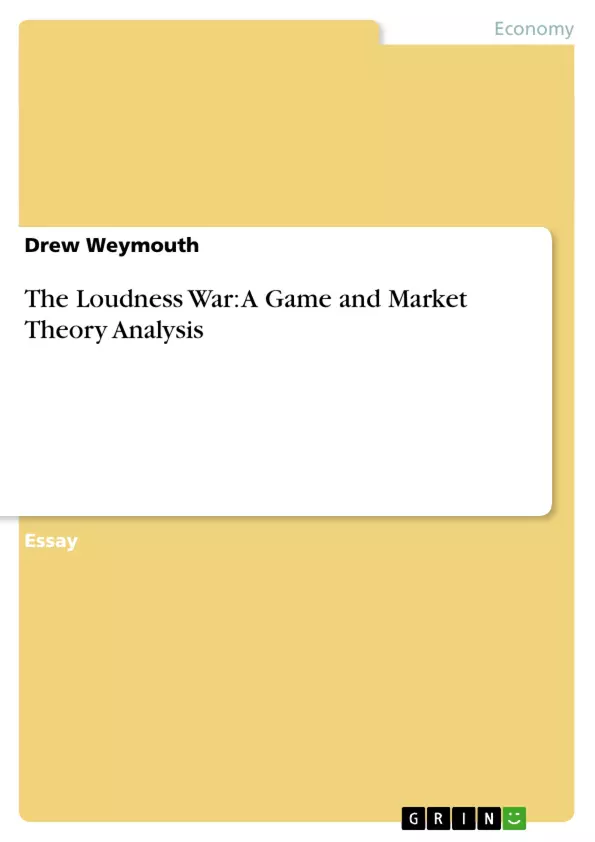This paper examines the game theory and market theory behind the "loudness war" and why record companies are sacrifice sound quality to make their CDs louder.
Inhaltsverzeichnis (Table of Contents)
- Introduction and History
- Why the Loudness War?
- The CD Market: A Market for Lemons
- Ending the Loudness War: Changing the Payoffs
Zielsetzung und Themenschwerpunkte (Objectives and Key Themes)
This paper aims to analyze the phenomenon of the "loudness war" in commercial music recordings, using game theory and market theory. It explores the historical development of the loudness war, the economic motivations driving it, and its impact on both consumers and the market for music.
- The historical development of the loudness war in the context of different music formats.
- The strategic game theory framework applied to understand record company behavior in the loudness war.
- The market for lemons theory applied to explain how loudness war affects consumer choices and market dynamics.
- The impact of loudness normalization technologies on the incentives driving the loudness war.
- The potential for initiatives like dynamic range certification to counter the negative effects of hyper-compression.
Zusammenfassung der Kapitel (Chapter Summaries)
- Introduction and History: This chapter traces the history of the loudness war from its origins in the 1950s and 1960s to its intensification with the rise of the compact disc. It outlines the key factors driving the loudness war, including the belief that louder music is perceived as more appealing and the technological limitations of digital audio.
- Why the Loudness War?: This chapter analyzes the economic motivations behind the loudness war, presenting it as a two-player strategic game. It demonstrates how the loudness war resembles the Prisoner's Dilemma, where both record companies are incentivized to produce loud albums even though a quieter approach would be beneficial for both in the long run.
- The CD Market: A Market for Lemons: This chapter explores the impact of the loudness war on consumers, drawing a parallel with the "market for lemons" theory. It argues that the loudness war creates a market where poorly-mastered CDs with excessive compression are indistinguishable from well-mastered ones, leading to a decline in the perceived value of CDs for discerning listeners.
Schlüsselwörter (Keywords)
The key terms and concepts in this text include loudness war, game theory, market for lemons, dynamic range, hyper-compression, ReplayGain, Sound Check, audiophile, music industry, consumer behavior, and market equilibrium.
Frequently Asked Questions
What is the "Loudness War"?
It is the trend in the music industry to increase audio levels on CDs and digital files by using heavy dynamic range compression, often sacrificing sound quality.
How does the "Prisoner's Dilemma" apply here?
Record companies feel forced to make their music loud so it doesn't sound "weak" compared to competitors, even though everyone would benefit from better sound quality if they all stopped.
What is the "Market for Lemons" in the CD market?
It suggests that when consumers can't distinguish between high-quality mastering and poor (loud) mastering, the overall quality of products in the market declines.
Can loudness normalization end the war?
Yes, technologies like "Sound Check" or "ReplayGain" level out volume differences, removing the incentive for record companies to hyper-compress their music.
Why do people think louder music is better?
Psychoacoustically, human ears often perceive louder sounds as more exciting or clearer in the short term, driving the demand for higher volume levels.
- Citar trabajo
- Drew Weymouth (Autor), 2012, The Loudness War: A Game and Market Theory Analysis, Múnich, GRIN Verlag, https://www.grin.com/document/206816



